“Strange are the uses of adversity.” That’s a fact. When I’m up here in my study with the radio on and some old book in my hands and it’s nighttime and the wind blows and the house creaks, I forget where I am, and it’s as though I’m back in hard times for a minute or two, and there’s a sweetness in the experience which I don’t understand. But that only enhances the value of it. My point here is that you never do know the actual nature even of your own experience. Or perhaps it has no fixed and certain nature. I remember my father down on his heels in the rain, water dripping from his hat, feeding me biscuit from his scorched hand, with that old blackened wreck of a church behind him and steam rising where the rain fell on embers, the rain falling in gusts and the women singing “The Old Rugged Cross” while they saw to things, moving so gently, as if they were dancing to the hymn, almost. In those days no grown woman ever let herself be seen with her hair undone, but that day even the grand old women had their hair falling down their backs like schoolgirls. It was so.joyful and sad. I mention it again because it seems to me much of my life was comprehended in that moment. Grief itself has often returned me to that morning, when I took communion from my father’s hand. I remember it as communion, and I believe that’s what it was.
I can’t tell you what that day in the rain has meant to me. I can’t tell myself what it has meant to me. But I know how many things it put altogether beyond question, for me.
Now all the old women have their hair cut short and colored blue, which is fine, I suppose.
***
Whenever I have held a Bible in my hands, I have remembered the day they buried those ruined Bibles under the tree in the rain, and it is somehow sanctified by that memory. And I think of the old reverend himself preaching in the ruins of his church, with all the windows open so the few that were there could hear “The Old Rugged Cross” drifting up the hill from the Methodist meeting. And my own church is sanctified by the story that was told to me. I remember my father said when the two of them first came home, they found the roof of the church in such disrepair that there were buckets and pans set in the aisle and on the benches. He said the women had planted climbing roses against the building and along the fence, so it looked prettier than it had ever looked before. Prairie had come into the fields and the orchards again, and there were sunflowers growing in the roads between the ruts. The women had their prayer meetings and their Bible studies even though the church was falling into ruin around them. I think about that, and it is strong and lovely in my mind. I truly believe it is waste and ingratitude not to honor such things as visions, whether you yourself happen to have seen them or not. That said, we were always a little careful about approaching the old man from the right side. It was his right eye he was missing, and we had the impression that it was on that side his visions came to him. He never spoke to us about them very much, since he felt our attitude on the subject was more or less entirely wrong. Nevertheless, we tried to be properly respectful. Sometimes when I came home from school my mother would meet me at the back porch and whisper, “The Lord is in the parlor.” Then I’d come creeping in in my socks and I’d just glance in through the parlor door and there my grandfather would be, sitting on the left end of the sofa, looking attentive and sociable and gravely pleased. I would hear a remark from time to time, “I see your point,” or “I have often felt that way myself.” And for a few days afterward the old man would be radiant and purposeful and a little more flagrant in his larcenies. Once he told us at supper, “This afternoon I met the Lord over by the river, and we fell to talking, you know, and He made a suggestion I thought was interesting. He said, ‘John, why don’t you just go home and be old?’ But I had to tell him I wasn’t sure I was up to the traveling.”
“Papa,” my mother said, “you are home. He probably just meant you should ease up on yourself a little.”
“Well,” the old man said, ” well…, ” and sank back into his radiance, thinking whatever it was he thought.
My father would say afterward that if the old man was persuaded the Lord wanted him back in Kansas, nothing we said would have any influence one way or another. It was important to him to believe that, though I doubt he ever really did.
Once when I was walking to school I saw some children teasing my grandfather, as if he were just any scrawny old fellow picking blackberries into his hat, nodding a little and talking a little as he did it. They were coming up to him on that right side and touching his arm, tugging his coat. When they did, it would set him to nodding and talking, and they would clap their hands over their mouths and run away.
Now, I was astonished at this. I realize how much I did, in some sense, believe that there was a sort of sacredness just to the right of him, and it really shocked me that those children could violate it as they were doing. I was standing there, taking it in, trying to decide what to do, when the old man wheeled around and planted that stare on me. How he knew I was there I don’t know, and why he looked at me that way is a thing I never have understood, as if I were the betrayer. It felt unfair to me at the time, but I never could dismiss it. I never could tell myself that it was just an error, that there was nothing in it.
Well, I’ll confess I did feel a certain embarrassment about him. It may even have been shame. And it was not the first time I had felt it, either. But I was a child at the time, and it seems to me he might have made some allowance. These people who can see right through you never quite do you justice, because they never give you credit for the effort you’re making to be better than you actually are, which is difficult and well-meant and deserving of some little notice.
I might as well say this, too. It hurt us all something dreadful that he left the way he did. We knew there was judgment in it, and whatever we might say for ourselves, for our reasonableness and our good intentions, we knew they were trivial by his lights, and that made them a little bit trivial by our lights. He took so much away with him when he left.
My father said when he walked into his father’s church after they came back from the army the first thing he saw was a piece of needlework hanging on the wall above the communion table. It was very beautifully done, flowers and flames surrounding the words “The Lord Our God Is a Purifying Fire.” I suppose that is why I always think of my grandfather’s church as the one struck by lightning. As in fact it was.
My father said it was that banner that had sent him off to sit with the Quakers. He said the very last word he would have applied to war, once he had had a good look at it, was “purifying,” and the thought that those women could believe the world was in any way purer for the loss of their own sons and husbands was appalling to him. He stood there looking at it, visibly displeased by it, apparently, because one of the women said to him, “It’s just a bit of Scripture.”
He said, “I beg your pardon, ma’am. No, that is not Scripture.” “Well,” she said, “then it certainly ought to be.”
And of course that was terrible to his mind, that she could have thought such a thing. And yet if those precise words don’t occur in the Bible, there are passages they could be said to summarize fairly well. That may have been all she meant.
I have always wished I could have seen it, that tapestry they made, if that’s what it was. He said there were cherubim to either side of it, with their wings thrown forward the way they are in the old pictures, and then, where the Ark of the Covenant would have been, those incendiary words, and flowers and flames around them and above them. I don’t know how those women managed to find the material for it, how much snipping and raveling of their few best clothes they’d have to have done to make such a thing as that. And I’ve always wondered what happened to it. Material things are so vulnerable to the humiliations of decay. There are some I dearly wish might be spared.
Читать дальше












